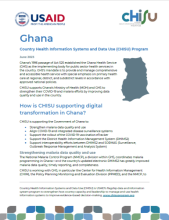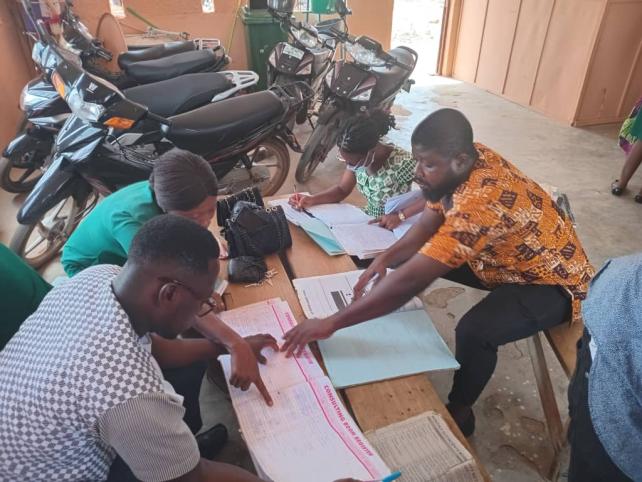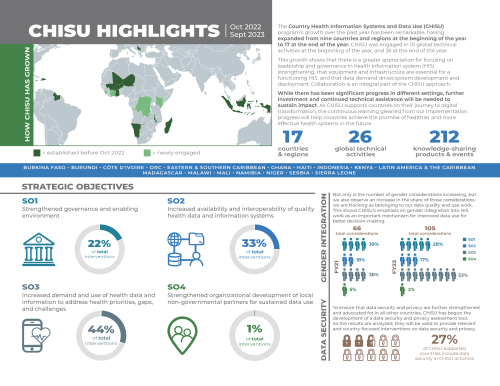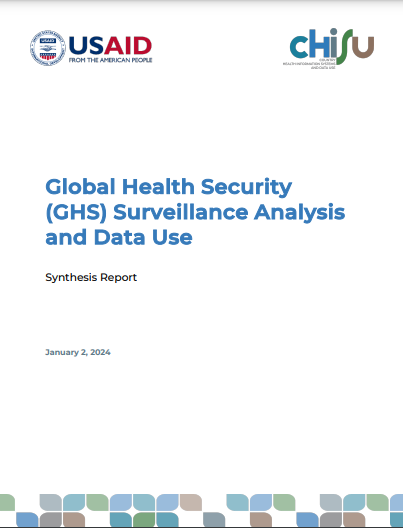Ghana
CHISU is supporting the Government of Ghana to:
- Strengthen malaria data quality and use
- Align COVID-19 and integrated disease surveillance systems
- Support the rollout of the COVID-19 vaccination eTracker
- Support the District Health Information Management System (DHIMS2)
- Support interoperability efforts between DHIMS2 and SORMAS (Surveillance, Outbreak Response Management and Analysis System)
Strengthening malaria data quality and use
The National Malaria Control Program (NMCP), a division within GHS, coordinates malaria programming in Ghana—and the country’s updated electronic DHIMS2 has greatly improved malaria data quality, timely reporting, and completeness. CHISU is working with GHS, in particular the Center for Health Information Management (CHIM), the Policy Planning Monitoring and Evaluation Division (PPMED), and the NMCP, to strengthen the systems for collecting malaria-related data, assess the readiness of malaria data systems to interoperate, and strengthen the quality, analysis, and use of malaria data. CHISU is building and strengthening the capacity of district staff in data validation and usage through training followed by district supportive supervision follow-up visits.
Aligning surveillance systems
CHISU’s surveillance systems alignment support is focused on the growth of SORMAS into a robust, digitized, and integrated surveillance system that is aligned and interoperable with DHIMS2 and its e-trackers, and fully owned by GHS. SORMAS, which was adapted from the Nigerian context to monitor Ebola in order to manage COVID-19 surveillance in Ghana, has now been adopted as the country’s electronic Integrated Disease Surveillance and Response (eIDSR) system and monitors over 44 notifiable diseases, including COVID-19. CHISU is supporting the development of policies and standard operating procedures (SOPs) that formalize GHS ownership and management of SORMAS, providing training for staff on SOPs and interoperable systems, and undertaking data quality improvement activities to ensure usability and reliability of the information produced by SORMAS.
CHISU is also supporting GHS to facilitate interoperability and alignment between SORMAS and DHIMS2. Additionally, CHISU conducted assessments to determine the information and communication technology (ICT) needs and human resources required to maintain SORMAS. CHISU is also supporting the training of surveillance staff at the subnational level on use of SORMAS, and is addressing ICT infrastructure gaps of the system by providing laptops, tablets, internet data bundles, and subscriptions for server storage capacity for SORMAS.
Supporting the COVID-19 vaccination eTracker and DHIMS2
At the onset of the COVID-19 pandemic, GHS (in collaboration with the USAID Health Systems Strengthening Accelerator) launched a COVID-19 vaccination module of the DHIMS2 eTracker. To scale up use of the eTracker, CHISU is supporting a step-down training beginning with regional staff on the use of the COVID-19 vaccination eTracker.
Additionally, CHISU is implementing an evidence-based systematic approach to scaling up eTracker training by building a series of review activities into the implementation process. GHS has experienced challenges with the DHIMS2 server, affecting both data download and upload by the facility staff and leading to a data backlog. Bottlenecks identified require enhancing the capacity of the PPMED staff to be better prepared to handle such occurrences in the future. To effectively deploy the system, cybersecurity and data privacy were identified as areas that required capacity strengthening among the PPMED staff to guarantee data safety in DHIMS2.
CHISU is working to enhance the capacity of GHS to manage their eight DHIMS2 server instances (including that of the COVID-19 eTracker) by providing cybersecurity and data security training for staff managing the frontend, design, and backend of the current DHIMS2 and eTracker instances.

Activity Updates
Strengthening Malaria Data Quality in Ghana

CHISU is working at different levels of the government to address key data quality challenges through supportive supervision and coaching visits. Read more ›
Blog Posts
Improving health equity in Ghana with geo-enabled digital microplanning tools
Learn how moving from paper to digital maps is strengthening the Ghana Heath Service's microplanning process to increase equitable access to quality health services. Read more ›
News
CHISU Ghana trains laboratory staff to support national mpox outbreak response
In Ghana, we are supporting national mpox outbreak response efforts by training laboratory staff to enter data into the country’s disease surveillance system. Read more ›
Resources

CHISU Highlights from October 2022–September 2023
The Country Health Information and Data Systems Use (CHISU) program experienced remarkable growth from October 2022–September 2023, expanding from nine countries and regions at the beginning of the year to 17 at the end of the year. CHISU was engaged in 10 global technical activities at the beginning of the year, and 26 at the end of the year.

Global Health Security (GHS) Surveillance Analysis and Data Use
This study assessed the gaps in the use of disease surveillance data for public health emergencies in Burkina Faso, Burundi, Ghana, Kenya, and Madagascar to identify opportunities for better integration of surveillance data with both routine health data and non-health data.